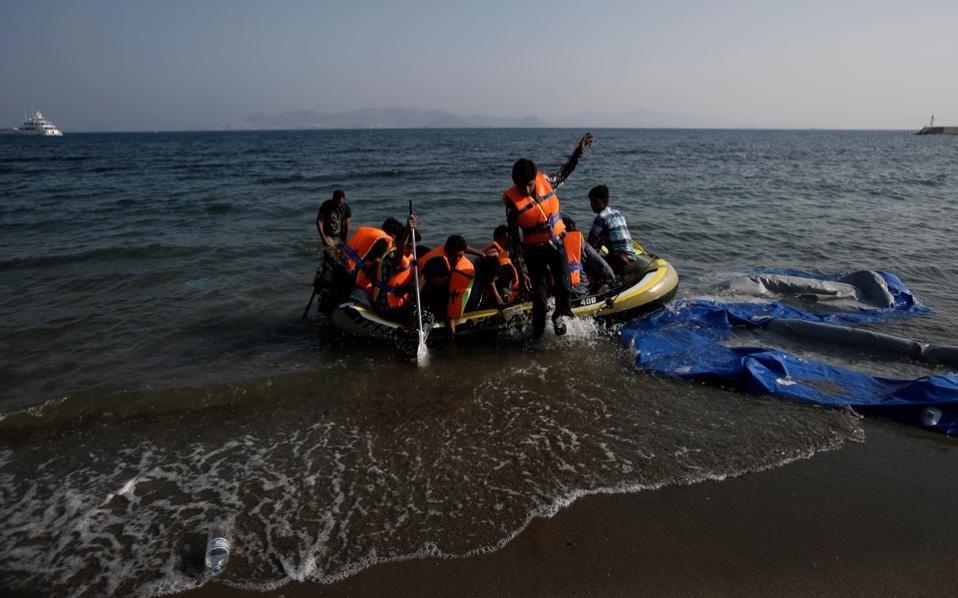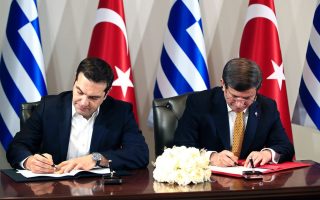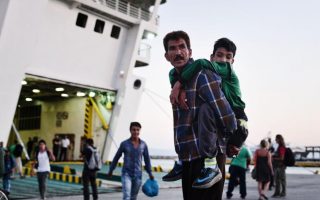Europe’s deal with Turkey fails to deter migrant attempts for now

Turkey's coastguard intercepted dozens of mostly Syrian migrants in coves along the Aegean coast on Wednesday as they continued to attempt perilous sea crossings to Greece despite Ankara's efforts to stem the flow under a deal with the European Union.
A group of 42 people, more than a dozen of them children, sat inside a coastguard compound, some lying under blankets, in the seaside resort of Didim after being detained. Scores more waited among boulders by the beach, watched by armed police, as a bus came to take them away.
"We're afraid of staying here and afraid of staying in Syria … We're fleeing to the country that will take us. We want safety, someone to care for us," said Sameeha Abdullah, one of the group near the beach, who fled Syria's civil war.
Just offshore, a coastguard boat approached what appeared to be a small vessel carrying more migrants. Some officials fear a scramble to cross to the nearby Greek islands, despite increased NATO-backed sea patrols in the Aegean, before the tentative agreement with the EU comes into full force.
Under the draft deal struck on Monday, Turkey agreed to take back all irregular migrants in exchange for more funding, an earlier introduction of visa-free travel to Europe for Turks, and a speeding up of Ankara's long-stalled EU membership talks.
The aim, Prime Minister Ahmet Davutoglu and EU leaders have said, is to discourage illegal migrants and break the business model of human smugglers who have fueled Europe's largest migration crisis since World War Two. The message, they say, is simple: try to cross illegally and get sent straight back.
But in a shabby sea-front hotel in Didim, off whose coast 25 migrants drowned on Sunday when their boat capsized, few had heard of the deal. A group of migrants from the Iraqi city of Mosul, stuck because they could not afford to pay the smugglers, said they were still determined to leave.
"Even if they catch me, what am I going to do here? I may as well die trying," said Hussein, 45, who said his three sons were killed by Islamic State militants in Iraq.
The hotelier, who gave his name as Enes, said a group of 20 Syrians, whom he collectively charged 500 lira ($170) for the night, had left yesterday for Europe. But he was sure more would come.
"Even if Europe gave Turkey hundreds of billions for refugees, Syrians still wouldn't stay. Most of their family is there so they're joining them," he said.
Turkey has no intention of sending refugees back to conflict zones and sees no legal hurdles to implementing the deal, Foreign Minister Mevlut Cavusoglu said on Wednesday, after meetings with Belgian officials in Ankara.
EU and Turkish officials are scrambling to finalize the deal before their next summit on March 17-18, and Cavusoglu said the bloc had largely accepted Turkey's terms.
But the United Nations and human rights groups have warned that blanket returns without considering individual asylum cases could be illegal. And it remains far from clear that the message will get through to desperate families who see smuggling as their surest route into Europe as its borders close.
Even as groups of migrants were detained on the beaches, more arrived by taxi in Didim, a popular holiday resort with yachts bobbing in its marina. Some carried bags, children in tow, and headed for the town's small hotels, which like in other parts of the Aegean coast, have been profiting from migrant business in the tourism low season.
"The markets, the hotels, the restaurants – everyone was smiling. Because of the refugees we eat bread," said the manager of one hostel. The hostel is in Basmane, a run-down neighborhood of Izmir, the main city on the Turkish Aegean coast and long a stopover for migrants trying to reach Europe during the Iraq wars and Arab Spring uprisings.
More than a million people fleeing war and poverty in the Middle East and beyond have flooded into the EU since early 2015, most crossing the Aegean from Turkey to Greece in small boats, then heading north through the Balkans to Germany.
Border shutdowns further north have blocked the 'Balkans corridor', leaving tens of thousands of migrants trapped in Greece. Former Yugoslav Republic of Macedonia (FYROM) has closed its border to illegal migrants after Slovenia, Croatia and Serbia announced tight new restrictions on migrant entry.
Rights group Amnesty International called the proposed mass return of migrants under the EU deal with Turkey a "death blow to the right to seek asylum." Relief charity Doctors without Borders said it was cynical and inhumane.
But Davutoglu insisted the preliminary deal would not stop Syrian refugees legitimately seeking shelter in Europe. He and Greek Prime Minister Alexis Tsipras signed an amendment to the countries' readmission agreement late on Tuesday to make returning third country nationals easier.
"The aim here is to discourage irregular migration and … to recognize those Syrians in our camps who the EU will accept – though we will not force anyone to go against their will – on legal routes," he said after a meeting with Tsipras in Izmir.
Under the tentative deal with Ankara, the EU would admit one refugee directly from Turkey for each Syrian it took back from the Greek Aegean islands. Those who attempted the sea route illegally would be returned and go to the back of the queue.
With new groups of migrants from Syria, Iraq, Afghanistan and elsewhere continuing to arrive along Turkey's coast in the hope of crossing to Greece, that message appears for now not to be getting through, to the frustration of some local residents.
Whatever's necessary should be done. The refugees should be gathered in one spot in my opinion. Everything should be done to ensure everyone's comfort, peace and welfare," said Armagan Gulcicek, an Izmir resident in a street full of cafes and stores popular with migrants, some of them selling life jackets.
"Let’s put an end to this nonsense."
[Reuters]





